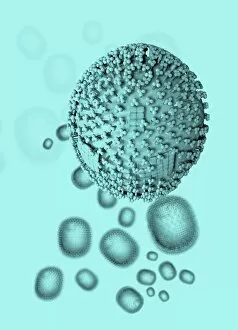Antigens Collection (page 2)
Antigens play a crucial role in our immune system's defense against various pathogens
All Professionally Made to Order for Quick Shipping
Antigens play a crucial role in our immune system's defense against various pathogens. One such pathogen is the Hepatitis B virus, which can cause severe liver damage if left untreated. The presence of specific antigens on the surface of Hepatitis B viruses triggers an immune response, leading to the production of antibodies that neutralize and eliminate these harmful invaders. In this captivating image captured under a transmission electron microscope (TEM), we get a glimpse into the intricate structure of Hepatitis B viruses. Their spherical shape and distinct outer envelope are highlighted, emphasizing the importance as key targets for our immune cells. But antigens don't stop at just viral infections; they also come into play when dealing with other diseases like Hantavirus or even allergies like perfume allergy responses. Our bodies recognize these foreign substances as potential threats and mount an antigen-specific response to protect us from harm. Artwork depicting the bird flu virus particle showcases yet another example where antigens become significant players in disease prevention. By identifying unique viral proteins displayed on their surfaces, our immune system recognizes and combats these infectious agents effectively. The repeated mention of Hepatitis B viruses throughout signifies their significance in immunology research due to their complex antigenic composition. Scientists continue to study these viruses intensively to develop better diagnostic tools, vaccines, and antiviral treatments targeting specific antigens associated with them. Understanding how antigens interact with our immune system opens doors for advancements in medicine and public health strategies aimed at combating infectious diseases more effectively. As we delve deeper into unraveling the mysteries surrounding antigens, we inch closer towards a healthier future where diseases caused by pathogens can be controlled or eradicated altogether through targeted interventions based on antigen recognition mechanisms.



